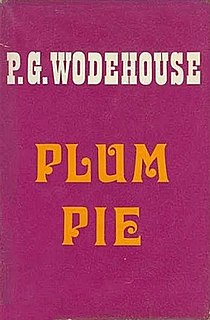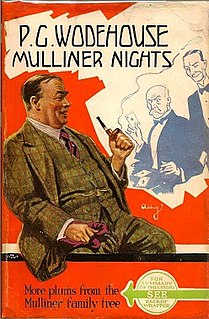Related Research Articles
Mr. Mulliner is a fictional character from the short stories of P. G. Wodehouse. Mr. Mulliner is a loquacious pub raconteur who, no matter what the topic of conversation, can find an appropriate story about a member of his family to match it.

Plum Pie is a collection of nine short stories by P. G. Wodehouse, first published in the United Kingdom on 22 September 1966 by Barrie & Jenkins, and in the United States on 1 December 1967 by Simon & Schuster, Inc., New York. The collection's title is derived from P. G. Wodehouse's nickname, Plum.

Blandings Castle and Elsewhere is a collection of short stories by P. G. Wodehouse. It was first published in the United Kingdom on 12 April 1935 by Herbert Jenkins, London, and, as Blandings Castle, in the United States on 20 September 1935 by Doubleday Doran, New York. All the stories had previously appeared in Strand Magazine (UK) and all except the last in various US magazines.

My Man Jeeves is a collection of short stories by P. G. Wodehouse, first published in the United Kingdom in May 1919 by George Newnes. Of the eight stories in the collection, half feature the popular characters Jeeves and Bertie Wooster, while the others concern Reggie Pepper, an early prototype for Bertie Wooster.
The following is a list of short stories by P. G. Wodehouse grouped by the main series to which they belong, if applicable.

Mr Mulliner Speaking is a collection of nine short stories by P. G. Wodehouse. It was first published in the United Kingdom on April 30, 1929 by Herbert Jenkins, and in the United States on February 21, 1930 by Doubleday, Doran. The stories were originally published in magazines in the UK and the US between 1924 and 1929.

Meet Mr. Mulliner is a collection of short stories by P. G. Wodehouse. First published in the United Kingdom on 27 September 1927 by Herbert Jenkins, and in the United States on 2 March 1928 by Doubleday, Doran. The short stories were originally published in magazines, mainly The Strand Magazine in the UK and Liberty in the US.

Mulliner Nights is a collection of short stories by P. G. Wodehouse. First published in the United Kingdom on 17 January 1933 by Herbert Jenkins, and in the United States on 15 February 1933 by Doubleday, Doran. The stories in the collection were originally published in magazines in the UK and the US between 1930 and 1932.

Young Men in Spats is a collection of short stories by P. G. Wodehouse, first published in the United Kingdom on 3 April 1936 by Herbert Jenkins, London, then in the United States with a slightly different selection of stories on 24 July 1936 by Doubleday, Doran, New York.

The Uncollected Wodehouse is a collection of early newspaper and magazine articles and short stories by P. G. Wodehouse. First published in the United States on October 18, 1976 by Seabury Press, New York City, it contains 14 short stories. Five of the stories had appeared in the United Kingdom in the 1914 collection The Man Upstairs. All had previously appeared in UK. periodicals between 1901 and 1915; some had also appeared in the U.S. Five short items are included from UK magazines of the 1900–06 period; ten items from 1914–19, nine from the U.S. Vanity Fair magazine.

Reginald "Reggie" Pepper is a fictional character who appears in seven short stories by English author P. G. Wodehouse. Reggie is a young man-about-town who gets drawn into trouble trying to help his pals. He is considered to be an early prototype for Bertie Wooster, who, along with his valet Jeeves, is one of Wodehouse's most famous creations.
"Mulliner's Buck-U-Uppo" is a short story by the British comic writer P. G. Wodehouse. A part of the Mr. Mulliner series, the story was first published in the United States by Liberty Magazine on September 4, 1926 and in the United Kingdom in The Strand in November 1926. It was collected in Meet Mr. Mulliner (1927).
"Best Seller" is a short story by the British comic writer P. G. Wodehouse. A part of the Mr. Mulliner series, the story was first published in the US in Cosmopolitan in June 1930, and in the UK in The Strand Magazine in July 1930. The Cosmopolitan version of the story does not include Mr Mulliner. The Mulliner version of the story was included in the collection Mulliner Nights (1933).

"The Smile That Wins" is a short story by the British comic writer P. G. Wodehouse. A part of the Mr. Mulliner series, the story was first published in the United States, in the October 1931 issue of The American Magazine. It was subsequently published in the United Kingdom in the February 1932 issue of The Strand Magazine. It was collected in Mulliner Nights (1933).
"A Slice of Life" is a short story by the British comic writer P. G. Wodehouse. A part of the Mr. Mulliner series, the story was first published in the UK in 1926 in The Strand Magazine, and appeared almost simultaneously in Liberty in the United States. It also appears in the collection Meet Mr. Mulliner. The main character in this story, Wilfred Mulliner, plays off-stage parts in "Mulliner's Buck-U-Uppo".
"The Truth About George" is a short story by the British comic writer P. G. Wodehouse. A part of the Mr. Mulliner series, the story was first published in July 1926 in Strand Magazine, and appeared almost simultaneously in Liberty in the United States. It also appears in the collection Meet Mr. Mulliner.
"The Bishop's Move" is a short story by the British comic writer P. G. Wodehouse. A part of the Mr. Mulliner series, the story was first published in August 1927 in Liberty in the United States, and in September 1927 in The Strand Magazine in the UK. It also appears in the collection Meet Mr. Mulliner.
"Honeysuckle Cottage" is a short story by the British author P. G. Wodehouse. The story was first published in the 24 January 1925 issue of the Saturday Evening Post in the United States, and in the February 1925 issue of the Strand Magazine in the United Kingdom.
Plum Stones is a set of 12 volumes of uncollected short stories by P. G. Wodehouse. All 25 stories were previously published in magazines, but not published in book form in the UK. The volumes were published posthumously between 1993 and 1995 in the UK by Galahad Books. The first two volumes were published in 1993, the following six in 1994, and last four in 1995.
"George and Alfred" is a short story by P. G. Wodehouse and a Mr. Mulliner story. It was published in Playboy magazine in the US in January 1967. The story was also included in the 1966 collection Plum Pie.
References
- Notes
- ↑ Midkiff, Neil (3 July 2019). "The Wodehouse short stories". Madame Eulalie. Retrieved 17 September 2019.
- ↑ McIlvaine (1990), pp. 63–64, A48.
- ↑ McIlvaine (1990), p. 144, D4.7.
- ↑ McIlvaine (1990), p. 186, D133.177.
- ↑ McIlvaine (1990), p. 149, D21.2.
- ↑ McIlvaine (1990), pp. 115–116, B5.
- ↑ McIlvaine (1990), pp. 116–117, B6a.
- ↑ McIlvaine (1990), p. 118, B8.
- ↑ McIlvaine (1990), pp. 120–121, B12.
- ↑ McIlvaine (1990), pp. 125–126, B23.
- ↑ McIlvaine (1990), p. 198, E128.
- ↑ Taves, Brian (2006). P. G. Wodehouse and Hollywood: Screenwriting, Satires and Adaptations. London: McFarland & Company. pp. 184–185. ISBN 978-0786422883.
- Sources
- McIlvaine, Eileen; Sherby, Louise S.; Heineman, James H. (1990). P. G. Wodehouse: A Comprehensive Bibliography and Checklist. New York: James H. Heineman Inc. ISBN 978-0-87008-125-5.